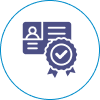Why Choose Service Management software company?
Selecting a provider of service management software can optimize operational efficiency and improve client satisfaction to an unprecedented degree. Our business specializes in offering all-inclusive solutions designed to simplify field service optimization, asset monitoring, SLA enforcement, inventory control, and strong reporting features. Clients can obtain state-of-the-art solutions that enhance resource allocation, minimize downtime, and guarantee adherence to industry standards by utilizing our knowledge.
1. Service Operations Streamlined
Selecting a provider of Service Management software is essential for companies trying to optimize their service operations. These businesses are experts in creating reliable ERP software systems designed to control and enhance a range of processes connected to services. An effective ERP system centralizes several processes, such as managing assets, processing service requests, upholding SLAs, and improving customer relations. Through collaboration with an Indian ERP software development company, companies can take advantage of affordable, scalable, and adaptable solutions. This guarantees smooth departmental operations and integration, promoting more efficient workflows and higher service delivery standards.
2. Better Asset Administration
For firms, avoiding downtime and optimizing resource usage are crucial outcomes of effective asset management. ERP solutions from a service management software provider allow for thorough asset tracking and management over the course of their lives. These systems offer real-time visibility into asset performance and availability throughout the asset lifecycle, from acquisition and deployment to maintenance planning and eventual retirement. Tailored ERP software designed by skilled teams in India helps businesses save money on operations, lengthen asset lifespans, and schedule preventive maintenance.

3. Adherence to SLA Conditions
Service Level Agreements (SLAs) are essential for preserving customer satisfaction because they outline the standards of service delivery that customers expect. Businesses can successfully manage and enforce SLAs by selecting an Indian ERP software development provider. SLA monitoring, warning, and escalation procedures are automated by sophisticated ERP systems, assuring rigorous commitment adherence and boosting client confidence. Businesses may preserve openness, responsibility, and dependability in service delivery by including strong SLA management tools into their operations. This will help them build enduring client connections and strengthen their position in the market.
4. Enhanced Field Service Administration
Managing field services effectively is crucial for companies that have mobility employees. ERP solutions from service management software providers boost field service operations with sophisticated scheduling, routing, and resource allocation features. These systems give field technicians seamless client communication capabilities, real-time job status updates, and mobile access to service requests. Businesses may drastically improve operational efficiency, shorten response times, and raise service quality standards by utilizing these capabilities. The dynamic demands of contemporary service-oriented enterprises are catered to by specialized teams in India through the development of ERP software systems.
5. Productive Inventory Management
In order to minimize carrying costs and stockouts and maintain ideal stock levels, inventory management is essential. Integrated inventory control elements are integrated into ERP solutions developed by service management software providers. These consist of seamless interaction with procurement systems, automated replenishment notifications, and real-time inventory tracking. Businesses can increase cash flow, decrease surplus inventory, and guarantee timely resource availability to support service operations efficiently by streamlining their inventory management procedures. ERP software created by knowledgeable teams in India and specifically designed to handle the special difficulties associated with inventory management in a variety of sectors helps to provide this competitive edge.
6. Strengthening Self-Service and Knowledge Base Capabilities
Offering a comprehensive knowledge base and self-service portal to staff members and clients is crucial for enabling them to solve problems on their own and quickly. Businesses that provide service management software often integrate ERP solutions with robust knowledge management features. By providing searchable FAQs, centralized knowledge libraries, and user-friendly self-help manuals, companies can enable customers to solve common issues on their own, minimizing the need for support workers and raising customer satisfaction levels. Businesses can implement mobile-responsive platforms and user-friendly interfaces that promote self-sufficiency and enhance the effectiveness of service delivery by utilizing ERP software created by professionals in India.
7. Using Advanced Reporting to Make Data-Driven Decisions
It is essential to have access to actionable insights for both strategic decision-making and ongoing service delivery improvement. ERP solutions with advanced reporting and analytics features are designed by service management software businesses. Businesses may monitor key performance indicators (KPIs) including technician productivity, service resolution rates, and customer satisfaction measures using customizable dashboards and real-time data. Through the utilisation of data analytics, enterprises may detect patterns, predict customer requirements, and enhance the distribution of resources, resulting in increased operational effectiveness and expansion. ERP software solutions created by Indian businesses, which come with potent reporting features designed to satisfy industry-specific specifications, bolster this analytical advantage.
8. App Integration and Mobile Accessibility
Giving field technicians mobile access to ERP systems is crucial for operational responsiveness and agility in today's mobile-first society. ERP solutions with integrated mobile apps and mobile-friendly interfaces are created by service management software businesses. Field technicians have mobile access to service requests, job status updates, digital signature capture, and client communication. Integrating other corporate apps, such CRM and billing systems, seamlessly guarantees data uniformity and improves departmental cooperation. Regardless of location or device, organizations can empower their mobile workforce and provide amazing service experiences by utilizing ERP software solutions produced by Indian enterprises.
Our Journey in Service Management software development
As we set out on a revolutionary path in the creation of service management software, we committed ourselves to creating cutting-edge solutions that redefine customer satisfaction and operational efficiency. Our team of professionals is deeply committed to providing high-quality ERP software that is customized to satisfy a wide range of business demands. We achieve this by combining industry knowledge with state-of-the-art technology. We enable organizations globally by optimizing service operations, improving asset management, and guaranteeing SLA adherence.
1. Origin and Goals
Being a well-known ERP software development business, we set out to reinvent service management with cutting-edge software solutions. We set out with the obvious goal of developing reliable ERP systems that would boost productivity and simplify operations while enabling companies to reach their maximum potential. This adventure began with a committed group of engineers who set out on this route with a burning desire to use technology to solve complex business problems and an unshakable commitment to excellence.
2. Investigation and Advancement
Comprehensive research and development (R&D) is essential to our path. In order to provide cutting-edge ERP solutions, we place a great priority on remaining on the cutting edge of technical breakthroughs. Our R&D efforts are driven by a thorough comprehension of developing technologies, client requirements, and industry trends. To make sure that our software not only meets but surpasses expectations in terms of performance, scalability, and user experience, this phase entails rigorous testing, prototyping, and refinement. To stay ahead in a competitive market scenario, we continuously explore and experiment to create and improve our solutions.
3. A cooperative strategy
A key component of our development approach is collaboration. We regularly interact with our clients to learn about their particular needs and issues. By cultivating transparent and honest communication, we create alliances based on mutual respect and success. We are able to provide custom ERP systems that are made to meet certain business requirements and promote operational efficiency because of our cooperative approach. We think that including stakeholders at every stage of the development process produces better results and guarantees that our solutions exactly match the needs of our clients.
4. The Agile Approach
We use agile approach in our development process to adjust to the dynamic nature of service management. Agile divides large projects into digestible sprints, enabling us to react quickly to shifting demands and market situations. This iterative process encourages ongoing development and makes it possible for us to produce software solutions of the highest caliber quickly. Our ERP systems adapt to our clients' changing business needs by putting flexibility and responsiveness first. This maximizes the systems' long-term value and effect.
5. Flexibility and Scalability
Flexible and scalable software is essential for service management. Our erp software development company is committed to building solutions that expand and change with the needs of the organizations we work with. Our scalable ERP systems are made to easily adapt to changing needs, whether they deal with adding more users, integrating new modules, or expanding operations. This scalability helps our clients maximize return on investment by future-proofing their investments and improving their capacity to react quickly to challenges and opportunities in the market.
6. Technology Integration and Innovation
The core of our development philosophy is innovation. In order to improve the functionality and efficiency of our ERP software, we are always investigating new technologies and approaches. We utilize cutting-edge innovations to provide businesses with actionable intelligence, whether it be through the integration of AI-driven analytics or the utilization of IoT for real-time data insights. We help our clients stay ahead of the curve and keep a competitive edge in their respective industries by embracing technology innovations. Our dedication to innovation guarantees that our ERP systems not only satisfy present demands but also foresee requirements and trends in the future.
7. Design with Users in Mind
An important consideration in our software development process is user experience, or UX. To develop user-friendly interfaces and workflows that improve usability and productivity, we take a user-centric design approach. We make sure that our ERP systems are not just robust but also simple for end users to use by conducting thorough usability testing and iterative feedback loops. Our goal in putting UX design first is to increase user happiness and adoption rates, which will help our clients' businesses succeed overall.

8. Security and Compliance
As a reputable ERP development business, we follow strict security and compliance guidelines. Two of the most important features of our software solutions are protecting sensitive data and guaranteeing regulatory compliance. To protect against cyber risks and illegal access, we put strong security processes into place and conduct frequent audits. Our dedication to privacy and data integrity builds customer trust and enhances our standing as a trustworthy provider of technology solutions.
9. Assistance and Success for Clients
Our unshakable dedication to the success of our clients directs our path. To guarantee our ERP systems are implemented, trained, and maintained without a hitch, we offer full support services. Our committed support staff responds to customer questions, solves problems, and offers tailored advice around-the-clock. Through the development of a customer-centric culture, we create long-lasting collaborations that go well beyond the initial software implementation. Prioritizing knowing our clients' distinct needs and objectives allows us to provide solutions that maximize return on investment and produce measurable business results.
10. Prospective Agenda
With a clear strategy for innovation and expansion, we are well-guided in our service management software development journey going forward. We're still committed to pushing the envelope in technology to provide revolutionary ERP solutions that enable companies to prosper in a digitally native economy. Our unwavering commitment to customer satisfaction and constant development positions us to take the lead in utilizing cutting-edge software solutions to shape the direction of service management in the future. To further improve the value proposition of our ERP systems and keep them at the forefront of industry norms and client expectations, we plan to grow our capabilities in AI, machine learning, and predictive analytics.
Exploring Diverse Types Of Service Management software company
Service management software is essential in today's changing corporate environment for improving customer satisfaction and operational effectiveness in a variety of industries. A provider of service management software focuses on creating products that increase service delivery, optimize resource allocation, and streamline operations. These businesses serve a broad range of industries, such as manufacturing, telecommunications, IT services, and healthcare.There are various types of service management software that are designed to meet the needs of different organizations. Software for IT service management (ITSM), for example, is concerned with maintaining service levels, handling issues, and managing IT infrastructure.
1. Software for Enterprise Resource Planning (ERP)
With the use of enterprise resource planning (ERP) software, businesses can manage and automate tasks across departments like finance, human resources, procurement, inventories, and more. ERP software unifies disparate corporate operations into a single system. As an ERP software development firm, we are experts at building reliable systems that improve productivity, simplify processes, and provide users instant access to vital business data. Our ERP solutions are built to meet the unique requirements of various industries, providing extensive capabilities, scalability, and flexibility to support intricate business processes.
2. Software for Customer Relationship Management (CRM)
Software for managing relationships and interactions with consumers and future customers is known as customer relationship management, or CRM software. Businesses can use it to automate marketing campaigns, handle leads, track customer interactions, and analyze customer data to enhance sales and customer service procedures. As an ERP development company, we incorporate CRM features to improve customer satisfaction and facilitate smooth customer administration within our ERP systems. With the help of our CRM modules, companies may improve sales funnels, personalize client interactions, and increase income by implementing focused marketing campaigns.

3. Software for Supply Chain Management (SCM)
The administration of the complete supply chain lifecycle, from the acquisition of raw materials to the distribution of completed goods, is made easier by supply chain management (SCM) software. It includes demand forecasting, order fulfillment, supplier relationship management, logistics, and inventory control. Robust supply chain management (SCM) modules that minimize expenses, shorten lead times, and enhance overall operational efficiency are part of our ERP software development. We give companies the ability to see their supply chains, improve their supplier relationships, and respond more quickly to customer demands.
4. Software for Human Capital Management (HCM)
Software for human capital management (HCM) focuses on overseeing an organization's human resources operations. Workforce planning, payroll management, talent acquisition, performance management, and employee development are some of its functions. Our ERP development company offers complete HR solutions that increase employee engagement, optimize HR procedures, and match workforce strategy with organizational goals. Our HCM modules give HR departments the tools they need to successfully hire top people, promote professional development, and maximize worker efficiency.
5. Software for Project Management
Organizations may plan, carry out, oversee, and manage projects more effectively with the use of project management software. Task management, resource allocation, scheduling, budgeting, and collaboration tools are some of its features. Robust project management features built into our ERP systems allow for timely project delivery, resource optimization, and smooth project execution. To increase project success rates and guarantee client satisfaction, we provide project teams with real-time information, consolidated communication channels, and workflow automation.
6. Software for Financial Management
The management of financial activities, including as accounting, budgeting, financial reporting, and regulatory compliance, is the main focus of financial management software. It gives companies precise financial information, makes financial planning easier, and aids in decision-making. Comprehensive financial management modules that automate accounting procedures, optimize financial workflows, and guarantee financial transparency and compliance are all included in our ERP development. We enable businesses to preserve their financial stability, maximize cash flow, and experience long-term growth.
7. Software for Asset Management
Throughout their lives, organizations may track, manage, and preserve both digital and physical assets with the use of asset management software. It consists of asset performance analysis, depreciation computation, maintenance scheduling, and asset tracking. We incorporate strong asset management features into our ERP software solutions to help businesses maximize asset use, minimize downtime, and prolong asset lifespan. For asset-intensive sectors, we guarantee regulatory compliance, enable proactive maintenance programs, and offer real-time visibility into asset data.
8. Analytics and Business Intelligence (BI) Software
Businesses can collect, examine, and visualize data to obtain practical insights and make wise business decisions by using business intelligence (BI) and analytics tools. Data mining, dashboards, predictive analytics, reporting tools, and data visualization features are all included. In order to provide businesses with comprehensive data insights, trend analysis, and performance monitoring, our ERP development company integrates cutting-edge BI and analytics modules into our ERP systems. With actionable intelligence, we facilitate data-driven decision-making, improve operational effectiveness, and stimulate business growth.
9. Software for Workflow Management
Workflow management software defines, implements, and tracks departmental and team-wide workflows to automate and optimize business operations. It consists of task delegation, workflow design tools, process automation, and alerting systems. Robust workflow management modules that enhance cooperation, reduce human bottlenecks, and streamline operational workflows are a feature of our ERP solutions. We make it easier to customize workflows, automate tedious jobs, and boost productivity throughout the entire organization.
10. Software for Compliance and Risk Management
Software for compliance and risk management assists companies in managing compliance audits, complying with legal obligations, and reducing operational risks. Risk assessment, policy management, audit trails, and regulatory reporting are some of its characteristics. We incorporate thorough compliance and risk management components into our ERP development so that businesses may proactively detect, evaluate, and reduce risks. By using efficient risk management techniques, we maintain company continuity, bolster internal controls, and assure regulatory compliance.


































